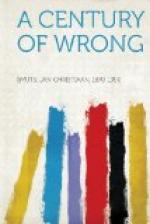No wonder that in 1815 a number of the Boers were driven into rebellion, a rebellion which found an awful ending in the horrible occurrence of the 9th of March, 1816, when six of the Boers were half hung up in the most inhuman way in the compulsory presence of their wives and children. Their death was truly horrible, for the gallows broke down before the end came; but they were again hoisted up in the agony of dying, and strangled to death in the murderous tragedy of Slachter’s Nek. Whatever opinions have been formed of this occurrence in other respects, it was at Slachter’s Nek that the first bloodstained beacon was erected which marks the boundary between Boer and Briton in South Africa, and the eyes of posterity still glance back shudderingly through the long vista of years at that tragedy of horror.
[Sidenote: The missionaries.]
This was, however, but the beginning. Under the cloak of religion British administration continued to display its hate against our people and nationality, and to conceal its self-seeking aims under cover of the most exalted principles. The aid of religion was invoked to reinforce the policy of oppression in order to deal a deeper and more fatal blow to our self-respect. Emissaries of the London Missionary Society slandered the Boers, and accused them of the most inhuman cruelties to the natives. These libellous stories, endorsed as they were by the British Government, found a ready ear amongst the English, and the result was that under the pressure of powerful philanthropic opinion in England our unfortunate people were more bitterly persecuted than ever, and were finally compelled to defend themselves in courts of law against the coarsest accusations and insults. But they emerged from the ordeal triumphantly, and the records of the criminal courts of the Cape Colony bear indisputable witness to the fact that there were no people amongst the slave-owning classes of the world more humane than the Africander Boers. Their treatment of the natives was based on the theory that natives ought not to be considered as mature and fully developed people, but that they were in reality children who had to be won over to civilisation by just and rigid discipline; they hold the same convictions on this subject to-day, and the enlightened opinion of the civilised world is inclining more and more to the same conclusion. But the fact that their case was a good one, and that it was triumphantly decided in their favour in the law courts, did not serve to diminish, but rather tended to sharpen, the feeling of injustice with which they had been treated.
[Sidenote: Emancipation of the slaves.]
A livelier sense of wrong was quickened by the way in which the emancipation of the slaves—in itself an excellent measure—was carried out in the case of the Boers.




